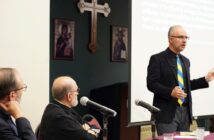Source: Oinos Educational Consulting
A LEADER’S GREATEST FOE
by Frank Marangos, D.Min., Ed.D., FCEP
“Well, here’s another nice mess you’ve gotten me into!”
Oliver Hardy

Fr Frank Marangos
When a leader is asked who or what gives them the most trouble, how do they usually answer? Where do they place blame when circumstances are challenging? Do they point to market forces or fierce competitors? Or is their anger directed towards the disgruntled employee, parishioner, or board member?
The classic catch phrase cited above was first uttered by Oliver Hardy to Stan Laurel in their 1930 film Another Fine Mess. The idiom’s subsequent use in a total of 17 comedic films attests to its utility for placing blame on someone else for difficult situations. While many are swift to utter Hardy’s assessment, mature leaders modestly admit that, oftentimes, their greatest foe is not the he or she – but actually the “me!”
Contemporary websites, blogs, and bookshelves are, unfortunately, replete with models that emphasize power-based leadership approaches. When faced with difficult situations, Quixotic leaders are encouraged to project control, command, and muscular personalities. Rarely are readers counseled to look inward . . . to candidly examine themselves before instantaneously placing blame on difficult people or problematic circumstances. Fortunately, authors and historical personalities can be identified that provide valuable correctives to such “not-me” dispositions.
Among other cultural annals, Holy Scripture is replete with examples of leaders whose difficult situations were utilized by God to help them distinguish the vulnerability of their character and, thereby, learn the need for divine providence. This is not to say that their temperaments were always modest. On the contrary, although they were able to part waters, slay lions, defeat overwhelming armies, and conceal grave eccentricities, their personal development required an honest and intense assessment of their inner dispositions. It was necessary for all of them to realize that their greatest adversary was not the Egyptian pharaoh, Philistinian giant, or malevolent Roman ruler. What they needed most was to admit that their fiercest foe was the cruelty of their own self-interest!
Mature leaders do not evade their inner frailties but deem them valuable opportunities to learn that God, and God alone, is able to intervene and turn their challenges into opportunities for personal growth. Instead of complaining about others and/or their circumstances, they turn to God for guidance, wisdom, and provision. In many ways, like the branch with which Moses transformed the bitter waters of Marah into sweetness (Ex. 15:23; Num. 33:8), they too are not reluctant to cast the hardy timber of God’s presence into the midst of their respective virulent situations.
Apart from the spiritual vivacity of Moses, the life of King David provides a most valuable paradigm for the cultivation of such God-centered leadership. David was no stranger to difficulties. Unfortunately, one of ways that he initially expressed his adolescent disposition towards challenging situations was his repeated rhetorical question: “What have I done now?” (1 Sam 17:29-32; 29:8). In many ways, like Hardy, his inquiry was an immature and arrogant protestation of his culpability. Unlike Oliver, however, David, did not have a Laurel to continually blame. Consequently, all he could do was to probe himself by asking: “How in the world did I get here?”
In his noteworthy book, Devoted to God: Blueprints for Sanctification (2016), Sinclair Ferguson suggests “it is always a shock to our pride when we discover that we are sinners—and not merely people who occasionally sin.” According to the noted Scottish theologian, the discovery that “sin is not simply some kind of infrequent aberration,” and consequently, “in need of daily being saved from sin’s power . . . reveals God’ sovereignty.” Saint Paul echoes a similar position when he confesses that, although he desires to do good, unfortunately, “it is the bad, that he does not want to do, that he continually ends up doing” (Romans 7:14). Accordingly, Ferguson insists that valid personal development cannot occur in a leader’s life until he/she is “honest about the presence and nature of sin in their life.” A leader must then “set their mind on Christ and on His reign in their life, and express their new identity in Christ by a life of holiness.”
A fascinating Old Testament account (2 Samuel 16) that occurred at the ultimate low point of David’s initial reign, exemplifies Ferguson’s claim. Having arrived at the small Jerusalem village of Bahurim, an irate relative of the late King Saul named Shimei approached, cursed, and threw stones at David and his entourage. Although God had expressly forbidden what Shimei was doing, commanding “not to revile God, nor curse a ruler of your people” (Exodus 22:28), David did not retaliate. Rather than slaying the agitator, David chose to reflect on his past sins and shortcomings that may have contributed to Shimei’s negative disposition. “Leave him alone, and let him curse,” David commanded, “for the Lord may look on my affliction, and will return me good for Shimei‘s cursing” (2 Samuel 16:12). While temporary, Scripture indicates that Shimei subsequently had a change of heart, and, in repentance, “fell down before the king beseeching his forgiveness” (2 Samuel 19:16-23).
David’s ability to stay calm in the face of such a personal assault was due to three important estimations: (1) recognition of his sinful nature, (2) confidence in God’s mercy and justice, and (3) assurance that God’s Will is more important than his own. David was consequently self-reflective, patient, understanding, and prayerful. David did not place his security in his title and power as king but firmly rooted in God’s goodness and justice, to an extraordinary degree. As God had strengthened him in the past, David’s confidence was unshakable. As a result, because he walked, talked, and waited on God, Scripture indicates that even his enemies could not prevail over him.
David was a teenager when he was anointed king by the Prophet Samuel (I Samuel 9:16). It would take 13 years, however, for him to replace the ineffective King Saul and actually sit on the throne of Israel. It was during this period that the young king learned how to handle a crisis, love his enemies, honor authority, act justly, love mercy, and walk humbly with his God. This “preparatory period” was an important refining, training and testing time during which he learned reliance on God and, thereby, became one of the greatest leaders in the Old Testament. Despite his human frailty, he was used as a model for all other kings to follow. Saint Luke identifies David as a leader worth imitating, writing that God removed Saul and placed David on the throne, because He considered David “a man after His own heart” (Acts 13:22). God considered David’s heart spiritually sensitive, teachable, and – most importantly – obedient. Personifying Ferguson’s thesis, David’s discovery of his sinful nature was, in fact, the foundation of his heart’s transformation.
In The Heart of an Executive: Lessons on Leadership from the Life of King David (1999), Richard D. Phillips chronicles the life of David. Phillips argues that David’s trials and triumphs provide comparable lessons to contemporary professionals. Like many other executives, David’s tenure includes recognizable stages: (1) preparation, (2) rise, (3) achievement, and finally, (4) succession. According to Phillips, David’s God-centered heart was shaped through these stages of self-leadership and, as a result, helped David emerge as a leader who was capable of inspiring others to achieve the impossible.
Reminiscent of Phillips, Psychologist Daniel Goleman contends that “exceptional leaders distinguish themselves because of superior self-leadership.” In his bestseller Emotional Intelligence (2005), he points out that, unfortunately, self-leadership is not a popular topic. “While leadership focuses on how one influences others,” Goleman insists, “self-leadership is about observing and managing oneself . . . and requires qualities like self-awareness, self-honesty, self-knowledge, and self-discipline.” For Goleman, self-leadership “means guiding yourself with gentleness, humility, and compassion throughout your daily existence.” Self-leaders are rare, he insists, due to three main reasons: (1) culture doesn’t support or encourage self-leadership or mature psychological development, (2) it takes effort, requiring daily practice and attention to make progress, and (3) a low level of what’s called emotional intelligence.
In his article, How to Cultivate Self-Leadership to Master Your Behavior and Realize Your Leadership Potential (2019) Scott Jeffrey describes self-leadership as the ability to “place authority within ourselves instead of putting it in another person or institution. Like Goleman, Jeffrey insists that this transition requires leaders to trust their “Inner Guide” and have faith it will direct us in a supportive way. Jeffrey outlines ten qualities of self-leadership: (1) curiosity, (2) self-honesty, (3) accountability, (4) self-discipline, (5) humility, (6) courage, (7) self-compassion, (8) assertiveness, (9) willingness to deal with discomfort, adapt to feedback (internal and external), and to let go of wanting control, and (10) inner faith.
Like Jeffrey, Andrea Goodridge suggests that leaders spend too much time “focusing on external factors, processes, people, and targets . . . constantly trying to shape and influence these external factors.” In The 4 Pillars of Self-Leadership: Time to Focus on You (2019), she recommends that, alternatively, leaders would garner greater results from changing their focus and allow themselves to (1) flourish as a leader, (2) align their values and strengths with their purpose, and (3) get the best out of themselves and their teams by focusing on what’s important to them.
In order to help navigate difficult situations with less stress and negative emotion, like Jeffrey, Goodridge outlines complimentary elements that together make up the concept of self-leadership: (1) self-discovery, (2) self-acceptance, (3) self-management, and (4) self-growth. In the final analysis, Goodridge asserts that self-leadership requires a core set of beliefs and values that guides and regulates a leader’s approach to life and relationships. As with Moses and David, self-management entails controlling impulses.
In their 2018 Harvard Review article Ego Is the Enemy of Good Leadership, Rasmus Hougaard and Jacqueline Carter insist that the higher leaders rise in the ranks, “the more they are at risk of getting an inflated ego. The bigger their ego grows, the more they are at risk of ending up in an insulated bubble, losing touch with their colleagues, the culture, and ultimately their clients.” According to the authors, “ego makes us susceptible to manipulation; it narrows our field of vision; and it corrupts our behavior, often causing us to act against our values.”
Hougaard and Carter describe several dangers of an inflated ego. When leaders believe they are the sole architects of their success, they “tend to be ruder, more selfish, and more likely to interrupt others. This is especially true in the face of setbacks and criticism. An inflated ego also narrows vision looking for information that confirms what it wants to believe. According to Hougaard and Carter breaking free of an overly protective or inflated ego requires selflessness, reflection, and courage. Like the aforementioned self-leadership advocates, they insist that humility, gratitude, and selflessness are vital correctives for reducing the damage created by an inflated ego.
According to a 2013 Barna Group Research Release entitled, A Missing Link in Christian Leadership, more than half of Christians in this country identify themselves as leaders (58%). And yet, more than eight in 10 (82%) indicate that they believe the United States is facing a leadership crisis because there aren’t enough leaders with “self-awareness.” The Release indicates that the first step to leading others well “is to gain a realistic understanding of ourselves.” Research consistently shows self-awareness as a foundational quality of career success. According to Multi-Health Systems, emotional intelligence is made up of six key composites with 3 elements in the first five as outlined below:
- Self-Perception – self-regard, self-actualization and emotional self-awareness.
- Self-Expression – emotional expression, assertiveness and independence.
- Interpersonal – interpersonal relationship, empathy and social responsibility.
- Decision Making – problem solving, reality testing and impulse control.
- Stress Management – flexibility, stress tolerance and optimism.
- Sovereign Foundations. God providentially works with the foundational items in the life of the leader-to-be in preparation for future leadership, beginning from birth.
- Inner Life Growth. Emerging leader receives both informal and formal training, and there are four predominant means through which the training takes place: imitation modeling, informal apprenticeships, mentoring, and academic study.
- Ministry Maturing. Emerging leaders serve in ministry as their prime focus, and get further training. It is also during this phase that the discovery of giftedness takes place.
- Life Maturing. Emerging leader is able to identify and begin using his combination of gifts, training, and experience (called “gift-mix”) with effectiveness and impact, and learns to develop its use to its full potential.
- Convergence. Individual becomes most effective in his role as a leader and in his ministry, as his potential is maximized and exercised. Unfortunately, only a few leaders ever experience this phase in their lifetime.
- Afterglow. This phase follows the active ministry of a leader by influencing a community based on a lifetime legacy of leadership.
Finally, in their Korn/Ferry Research Report, A Better Return on Self-Awareness (2013), David Zes and Dana Landis confirm the direct relationship between leader self-awareness and organizational financial performance. Zes and Landis conclude that “public companies with a higher rate of return (ROR) also employ professionals who exhibit higher levels of self-awareness.” Alternatively, “employees of poorly performing companies were 79% more likely to have low overall self-awareness than those at firms with robust ROR.”
Zes and Landis emphasize the potential implications of their research. Self-awareness, they insist, is the most crucial developmental breakthrough for accelerating personal leadership growth and authenticity. “Learning to pause to build self-awareness is an evolving process critical to leader success.” By doing so, the authors contend that leaders are “better able to know themselves” and, thereby, leverage the following potentialities:
- Knowledge of strengths to assert in appropriate circumstances.
- Knowledge of vulnerabilities, weaknesses, and distressing emotions, to check and prevent inappropriate responses.
- Protection against the loss of credibility.
- Increased trust and respect from others.
The notion that God’s precepts give mature leaders the ability to discern the difference between ambition and empowerment, virtue and impurity, was underscored by Pope Francis at his weekly General Audience of June 25, 2020. Focusing his catechesis on the Biblical figure of King David, the Pontiff said that David “was chosen for a unique mission that would play a central role in the history of the people of God and in our own faith.” The global leader of the Catholic Church continued by suggesting that David “was both saint and sinner, full of contradictions, yet in his vocation of leadership he was constant in prayerful dialogue with God.” For Francis, contemporary leaders are also “marked by contradictory forces and incoherent impulses.” But, if, like David, they persevere in prayer – “whatever their own vocation and the difficulties they may face – they will come to know the closeness of the Lord and be able to share this joy with others.”
The leadership philosophy of King David is firmly centered in his disposition of obediently guiding others according to the Word and Will of God. Emergent leaders are characterized by the desire of developing such a consistency. In the final analysis, God invites all leaders to nurture an inner-life of integrity, humility, and total surrender, to become servants “after his own Heart” who accept His Word and advance His Will.
A private school was once faced with a unique problem. A number of 12-year-old girls were beginning to use lipstick. Unfortunately, after applying their cosmetic they would press their mouths to the school’s bathroom mirrors, leaving dozens of little lip prints. However, while maintenance was forced to remove them every night, the girls would put them back the very next day.
The principal decided that something had to be done. She summoned the young girls to the bathroom and explained how their lip prints were causing a major problem. To demonstrate the difficulty, the principal asked the custodian to show the girls how much effort was required. He took a long-handled squeegee, and after dipping it in a toilet, cleaned the mirror with it. Since the demonstration, lip prints were no longer found on the girls’ bathroom mirror.
Without question, a leader’s greatest foe lies within. Whether we realize it or not, by kissing the reflection of our position, prowess, and/or celebrity in the mirror of hubris we are actually uniting the lips of our inner souls to the putrid waters of ego and self-rule! Only by accepting the grace of God’s Word and Will can we avoid such arrogant delusions and inaugurate the process of appropriately transfiguring the icon of our respective leadership vocations.



